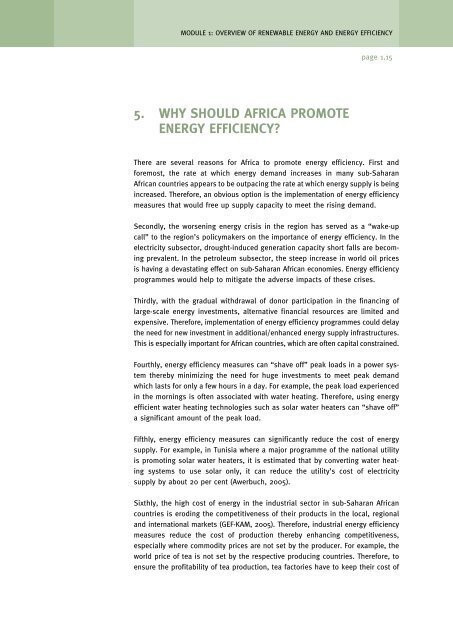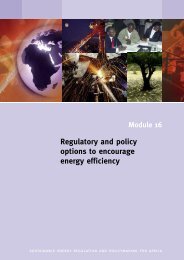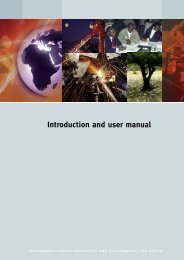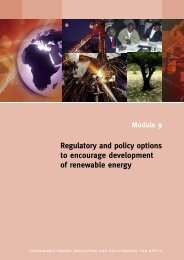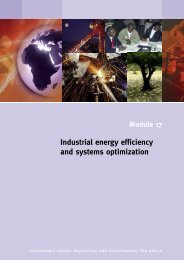Overview of renewable energy and energy efficiency - unido
Overview of renewable energy and energy efficiency - unido
Overview of renewable energy and energy efficiency - unido
- No tags were found...
You also want an ePaper? Increase the reach of your titles
YUMPU automatically turns print PDFs into web optimized ePapers that Google loves.
MODULE 1: OVERVIEW OF RENEWABLE ENERGY AND ENERGY EFFICIENCYpage 1.155. WHY SHOULD AFRICA PROMOTEENERGY EFFICIENCY?There are several reasons for Africa to promote <strong>energy</strong> <strong>efficiency</strong>. First <strong>and</strong>foremost, the rate at which <strong>energy</strong> dem<strong>and</strong> increases in many sub-SaharanAfrican countries appears to be outpacing the rate at which <strong>energy</strong> supply is beingincreased. Therefore, an obvious option is the implementation <strong>of</strong> <strong>energy</strong> <strong>efficiency</strong>measures that would free up supply capacity to meet the rising dem<strong>and</strong>.Secondly, the worsening <strong>energy</strong> crisis in the region has served as a “wake-upcall” to the region’s policymakers on the importance <strong>of</strong> <strong>energy</strong> <strong>efficiency</strong>. In theelectricity subsector, drought-induced generation capacity short falls are becomingprevalent. In the petroleum subsector, the steep increase in world oil pricesis having a devastating effect on sub-Saharan African economies. Energy <strong>efficiency</strong>programmes would help to mitigate the adverse impacts <strong>of</strong> these crises.Thirdly, with the gradual withdrawal <strong>of</strong> donor participation in the financing <strong>of</strong>large-scale <strong>energy</strong> investments, alternative financial resources are limited <strong>and</strong>expensive. Therefore, implementation <strong>of</strong> <strong>energy</strong> <strong>efficiency</strong> programmes could delaythe need for new investment in additional/enhanced <strong>energy</strong> supply infrastructures.This is especially important for African countries, which are <strong>of</strong>ten capital constrained.Fourthly, <strong>energy</strong> <strong>efficiency</strong> measures can “shave <strong>of</strong>f” peak loads in a power systemthereby minimizing the need for huge investments to meet peak dem<strong>and</strong>which lasts for only a few hours in a day. For example, the peak load experiencedin the mornings is <strong>of</strong>ten associated with water heating. Therefore, using <strong>energy</strong>efficient water heating technologies such as solar water heaters can “shave <strong>of</strong>f”a significant amount <strong>of</strong> the peak load.Fifthly, <strong>energy</strong> <strong>efficiency</strong> measures can significantly reduce the cost <strong>of</strong> <strong>energy</strong>supply. For example, in Tunisia where a major programme <strong>of</strong> the national utilityis promoting solar water heaters, it is estimated that by converting water heatingsystems to use solar only, it can reduce the utility’s cost <strong>of</strong> electricitysupply by about 20 per cent (Awerbuch, 2005).Sixthly, the high cost <strong>of</strong> <strong>energy</strong> in the industrial sector in sub-Saharan Africancountries is eroding the competitiveness <strong>of</strong> their products in the local, regional<strong>and</strong> international markets (GEF-KAM, 2005). Therefore, industrial <strong>energy</strong> <strong>efficiency</strong>measures reduce the cost <strong>of</strong> production thereby enhancing competitiveness,especially where commodity prices are not set by the producer. For example, theworld price <strong>of</strong> tea is not set by the respective producing countries. Therefore, toensure the pr<strong>of</strong>itability <strong>of</strong> tea production, tea factories have to keep their cost <strong>of</strong>


